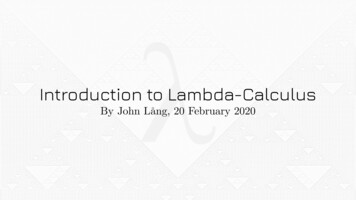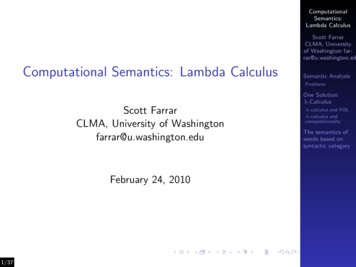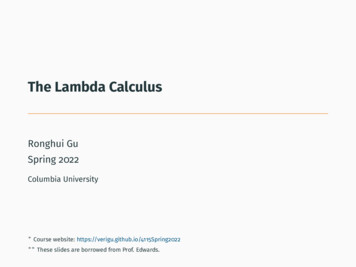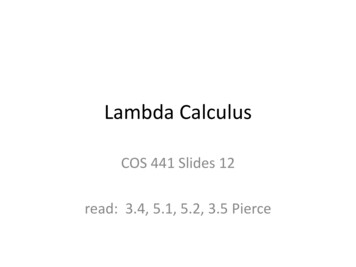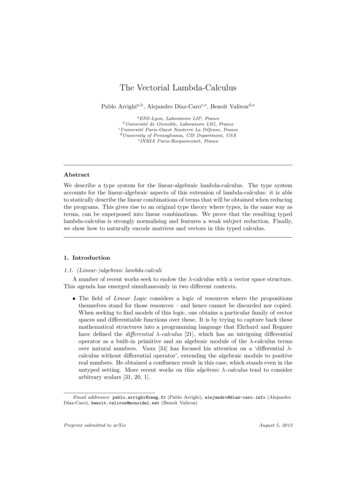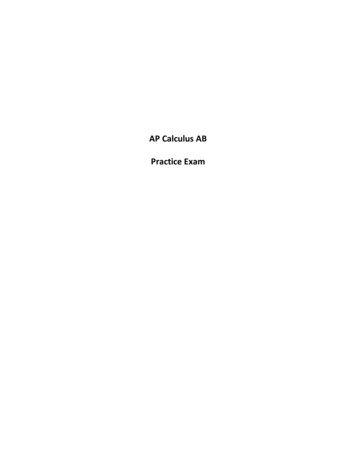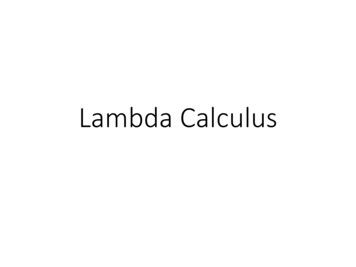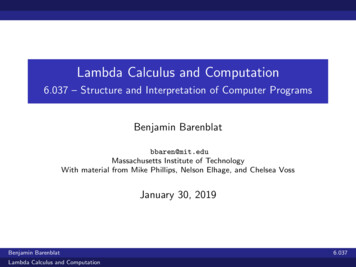
Transcription
Lambda Calculus and Computation6.037 – Structure and Interpretation of Computer ProgramsBenjamin Barenblatbbaren@mit.eduMassachusetts Institute of TechnologyWith material from Mike Phillips, Nelson Elhage, and Chelsea VossJanuary 30, 2019Benjamin BarenblatLambda Calculus and Computation6.037
Limits to ComputationDavid Hilbert’s Entscheidungsproblem (1928)Benjamin BarenblatLambda Calculus and Computation6.037
Limits to ComputationDavid Hilbert’s Entscheidungsproblem (1928): Build a calculatingmachine that gives a yes/no answer to all mathematical questions.Benjamin BarenblatLambda Calculus and Computation6.037
Limits to ComputationDavid Hilbert’s Entscheidungsproblem (1928): Build a calculatingmachine that gives a yes/no answer to all mathematical questions.Figure : Alonzo Church(1903-1995), lambda calculusBenjamin BarenblatLambda Calculus and ComputationFigure : Alan Turing (1912-1954),Turing machines6.037
Limits to ComputationDavid Hilbert’s Entscheidungsproblem (1928): Build a calculatingmachine that gives a yes/no answer to all mathematical questions.Figure : Alonzo Church(1903-1995), lambda calculusFigure : Alan Turing (1912-1954),Turing machinesTheorem (Church, Turing, 1936): These models of computationcan’t solve every problem.Benjamin BarenblatLambda Calculus and Computation6.037
Limits to ComputationDavid Hilbert’s Entscheidungsproblem (1928): Build a calculatingmachine that gives a yes/no answer to all mathematical questions.Figure : Alonzo Church(1903-1995), lambda calculusFigure : Alan Turing (1912-1954),Turing machinesTheorem (Church, Turing, 1936): These models of computationcan’t solve every problem. Proof: next!Benjamin BarenblatLambda Calculus and Computation6.037
Equivalence of Computation MethodsFirst part of the proof: Church–Turing thesis.Benjamin BarenblatLambda Calculus and Computation6.037
Equivalence of Computation MethodsFirst part of the proof: Church–Turing thesis.Any intuitive notion for a “computer” that you can come up withwill be no more powerful than a Turing machine or than lambdacalculus. That is, most models of computation are equivalent.Benjamin BarenblatLambda Calculus and Computation6.037
Equivalence of Computation MethodsFirst part of the proof: Church–Turing thesis.Any intuitive notion for a “computer” that you can come up withwill be no more powerful than a Turing machine or than lambdacalculus. That is, most models of computation are equivalent.Turing-complete means capable of simulating Turing machines.Benjamin BarenblatLambda Calculus and Computation6.037
Equivalence of Computation MethodsFirst part of the proof: Church–Turing thesis.Any intuitive notion for a “computer” that you can come up withwill be no more powerful than a Turing machine or than lambdacalculus. That is, most models of computation are equivalent.Turing-complete means capable of simulating Turing machines.Lambda calculus is Turing-complete (proof: later), and Turingmachines can simulate lambda calculus.Benjamin BarenblatLambda Calculus and Computation6.037
Equivalence of Computation MethodsFirst part of the proof: Church–Turing thesis.Any intuitive notion for a “computer” that you can come up withwill be no more powerful than a Turing machine or than lambdacalculus. That is, most models of computation are equivalent.Turing-complete means capable of simulating Turing machines.Lambda calculus is Turing-complete (proof: later), and Turingmachines can simulate lambda calculus.Some others:Turing machines are Turing-completeBenjamin BarenblatLambda Calculus and Computation6.037
Equivalence of Computation MethodsFirst part of the proof: Church–Turing thesis.Any intuitive notion for a “computer” that you can come up withwill be no more powerful than a Turing machine or than lambdacalculus. That is, most models of computation are equivalent.Turing-complete means capable of simulating Turing machines.Lambda calculus is Turing-complete (proof: later), and Turingmachines can simulate lambda calculus.Some others:Turing machines are Turing-completeScheme is Turing-completeBenjamin BarenblatLambda Calculus and Computation6.037
Equivalence of Computation MethodsFirst part of the proof: Church–Turing thesis.Any intuitive notion for a “computer” that you can come up withwill be no more powerful than a Turing machine or than lambdacalculus. That is, most models of computation are equivalent.Turing-complete means capable of simulating Turing machines.Lambda calculus is Turing-complete (proof: later), and Turingmachines can simulate lambda calculus.Some others:Turing machines are Turing-completeScheme is Turing-completeMinecraft is Turing-completeBenjamin BarenblatLambda Calculus and Computation6.037
Equivalence of Computation MethodsFirst part of the proof: Church–Turing thesis.Any intuitive notion for a “computer” that you can come up withwill be no more powerful than a Turing machine or than lambdacalculus. That is, most models of computation are equivalent.Turing-complete means capable of simulating Turing machines.Lambda calculus is Turing-complete (proof: later), and Turingmachines can simulate lambda calculus.Some others:Turing machines are Turing-completeScheme is Turing-completeMinecraft is Turing-completeConway’s Game of Life is Turing-completeBenjamin BarenblatLambda Calculus and Computation6.037
Equivalence of Computation MethodsFirst part of the proof: Church–Turing thesis.Any intuitive notion for a “computer” that you can come up withwill be no more powerful than a Turing machine or than lambdacalculus. That is, most models of computation are equivalent.Turing-complete means capable of simulating Turing machines.Lambda calculus is Turing-complete (proof: later), and Turingmachines can simulate lambda calculus.Some others:Turing machines are Turing-completeScheme is Turing-completeMinecraft is Turing-completeConway’s Game of Life is Turing-completeWolfram’s Rule 110 cellular automaton is Turing-completeBenjamin BarenblatLambda Calculus and Computation6.037
Does not compute?Are there problems which our notion of computing cannotsolve?Benjamin BarenblatLambda Calculus and Computation6.037
Does not compute?Are there problems which our notion of computing cannotsolve?Reworded: are there functions that cannot be computed?Benjamin BarenblatLambda Calculus and Computation6.037
Does not compute?Are there problems which our notion of computing cannotsolve?Reworded: are there functions that cannot be computed?Consider functions which map naturals to naturals.Benjamin BarenblatLambda Calculus and Computation6.037
Does not compute?Are there problems which our notion of computing cannotsolve?Reworded: are there functions that cannot be computed?Consider functions which map naturals to naturals.Can write out a function f as the infinite list of naturals f (0),f (1), f (2).Benjamin BarenblatLambda Calculus and Computation6.037
Does not compute?Are there problems which our notion of computing cannotsolve?Reworded: are there functions that cannot be computed?Consider functions which map naturals to naturals.Can write out a function f as the infinite list of naturals f (0),f (1), f (2).Any program text can be written as a single number, joiningtogether this listBenjamin BarenblatLambda Calculus and Computation6.037
Does not compute?Now consider every possible functionBenjamin BarenblatLambda Calculus and Computation6.037
Does not compute?Now consider every possible functionPut them in a big table, one function per row, one input percolumnBenjamin BarenblatLambda Calculus and Computation6.037
Does not compute?Now consider every possible functionPut them in a big table, one function per row, one input percolumnDiagonalize!Benjamin BarenblatLambda Calculus and Computation6.037
Does not compute?Now consider every possible functionPut them in a big table, one function per row, one input percolumnDiagonalize!We get a contradiction: here’s a function that’s not in yourlist.Benjamin BarenblatLambda Calculus and Computation6.037
Does not compute?Now consider every possible functionPut them in a big table, one function per row, one input percolumnDiagonalize!We get a contradiction: here’s a function that’s not in yourlist.Theorem (Church, Turing): These models of computation can’tsolve every problem.Benjamin BarenblatLambda Calculus and Computation6.037
How many uncomputable problems?Countably infinite: ℵ0Benjamin BarenblatLambda Calculus and Computation6.037
How many uncomputable problems?Countably infinite: ℵ0The number of naturalsBenjamin BarenblatLambda Calculus and Computation6.037
How many uncomputable problems?Countably infinite: ℵ0The number of naturalsThe number of binary stringsBenjamin BarenblatLambda Calculus and Computation6.037
How many uncomputable problems?Countably infinite: ℵ0The number of naturalsThe number of binary stringsThe number of programsBenjamin BarenblatLambda Calculus and Computation6.037
How many uncomputable problems?Countably infinite: ℵ0The number of naturalsThe number of binary stringsThe number of programsUncountably infinite: 2ℵ0Benjamin BarenblatLambda Calculus and Computation6.037
How many uncomputable problems?Countably infinite: ℵ0The number of naturalsThe number of binary stringsThe number of programsUncountably infinite: 2ℵ0The number of functions mapping from natural to naturalBenjamin BarenblatLambda Calculus and Computation6.037
Does not compute: Halting ProblemOkay, but can you give me an example?Benjamin BarenblatLambda Calculus and Computation6.037
Does not compute: Halting ProblemOkay, but can you give me an example?We’ve seen our programs create infinite lists and infinite loopsBenjamin BarenblatLambda Calculus and Computation6.037
Does not compute: Halting ProblemOkay, but can you give me an example?We’ve seen our programs create infinite lists and infinite loopsCan we write a program to check if an expression will return avalue?Benjamin BarenblatLambda Calculus and Computation6.037
Does not compute: Halting ProblemOkay, but can you give me an example?We’ve seen our programs create infinite lists and infinite loopsCan we write a program to check if an expression will return avalue?(define (halt? p); .)Benjamin BarenblatLambda Calculus and Computation6.037
Aside: what does this do?((lambda (x) (x x))(lambda (x) (x x)))Benjamin BarenblatLambda Calculus and Computation6.037
Aside: what does this do?((lambda (x) (x x))(lambda (x) (x x))) ((lambda (x) (x x))(lambda (x) (x x)))Benjamin BarenblatLambda Calculus and Computation6.037
Aside: what does this do?((lambda (x) (x x))(lambda (x) (x x))) ((lambda (x) (x x))(lambda (x) (x x))) ((lambda (x) (x x))(lambda (x) (x x)))Benjamin BarenblatLambda Calculus and Computation6.037
Aside: what does this do?((lambda (x) (x x))(lambda (x) (x x))) ((lambda (x) (x x))(lambda (x) (x x))) ((lambda (x) (x x))(lambda (x) (x x))) .Benjamin BarenblatLambda Calculus and Computation6.037
Does not compute: Halting ProblemContradiction!Benjamin BarenblatLambda Calculus and Computation6.037
Does not compute: Halting ProblemContradiction!(define (troll)(if (halt? troll); if halts? says we halt, infinite-loop((lambda (x) (x x)) (lambda (x) (x x))); if halts? says we don't, return a value#f))Benjamin BarenblatLambda Calculus and Computation6.037
Does not compute: Halting ProblemContradiction!(define (troll)(if (halt? troll); if halts? says we halt, infinite-loop((lambda (x) (x x)) (lambda (x) (x x))); if halts? says we don't, return a value#f))(halt? troll)Benjamin BarenblatLambda Calculus and Computation6.037
Does not compute: Halting ProblemContradiction!(define (troll)(if (halt? troll); if halts? says we halt, infinite-loop((lambda (x) (x x)) (lambda (x) (x x))); if halts? says we don't, return a value#f))(halt? troll)Halting Problem is undecidable for Turing Machines – and thus allprogramming languages. (Turing, 1936)Benjamin BarenblatLambda Calculus and Computation6.037
Does not compute: Halting ProblemContradiction!(define (troll)(if (halt? troll); if halts? says we halt, infinite-loop((lambda (x) (x x)) (lambda (x) (x x))); if halts? says we don't, return a value#f))(halt? troll)Halting Problem is undecidable for Turing Machines – and thus allprogramming languages. (Turing, 1936)Want to learn more computability theory? See 18.400J/6.045J or18.404J/6.840J (Sipser).Benjamin BarenblatLambda Calculus and Computation6.037
The Source of PowerWhat’s the minimal set of Scheme syntax that you need to achieveTuring-completeness?Benjamin BarenblatLambda Calculus and Computation6.037
The Source of PowerWhat’s the minimal set of Scheme syntax that you need to sifrecursionconsbooleanslambdaBenjamin BarenblatLambda Calculus and Computation6.037
Cons cells?(define (cons a b)(lambda (c)(c a b)))Benjamin BarenblatLambda Calculus and Computation6.037
Cons cells?(define (cons a b)(lambda (c)(c a b)))(define (car p)(p (lambda (a b) a)))Benjamin BarenblatLambda Calculus and Computation6.037
Cons cells?(define (cons a b)(lambda (c)(c a b)))(define (car p)(p (lambda (a b) a)))(define (cdr p)(p (lambda (a b) b)))Benjamin BarenblatLambda Calculus and Computation6.037
Booleans?(define true(lambda (a b)(a)))Benjamin BarenblatLambda Calculus and Computation6.037
Booleans?(define true(lambda (a b)(a)))(define false(lambda (a b)(b)))Benjamin BarenblatLambda Calculus and Computation6.037
Booleans?(define true(lambda (a b)(a)))(define false(lambda (a b)(b)))(define if(lambda (test then else)(test then else))Benjamin BarenblatLambda Calculus and Computation6.037
Booleans?(define true(lambda (a b)(a)))(define false(lambda (a b)(b)))(define if(lambda (test then else)(test then else))Also try: and, or, notBenjamin BarenblatLambda Calculus and Computation6.037
Numbers?Number N: A procedure which takes in a successor function s anda zero z, and returns the successor applied to the zero N times.For example, 3 is represented as (s (s (s z))), given s and zThis technique: Church numeralsBenjamin BarenblatLambda Calculus and Computation6.037
Numbers?(define church-0(lambda (s z)z))Benjamin BarenblatLambda Calculus and Computation6.037
Numbers?(define church-0(lambda (s z)z))(define (church-1(lambda (s z)(s z)))Benjamin BarenblatLambda Calculus and Computation6.037
Numbers?(define church-0(lambda (s z)z))(define (church-1(lambda (s z)(s z)))(define (church-2(lambda (s z)(s (s z))))Benjamin BarenblatLambda Calculus and Computation6.037
Numbers?(define (church-inc n)(lambda (s z)(s (n s z))))Benjamin BarenblatLambda Calculus and Computation6.037
Numbers?(define (church-inc n)(lambda (s z)(s (n s z))))(define (church-add a b)(lambda (s z)(a s (b s z))))Benjamin BarenblatLambda Calculus and Computation6.037
Numbers?(define (church-inc n)(lambda (s z)(s (n s z))))(define (church-add a b)(lambda (s z)(a s (b s z))))(define (also-church-add a b)(a church-inc b))Benjamin BarenblatLambda Calculus and Computation6.037
Numbers?(define (church-inc n)(lambda (s z)(s (n s z))))(define (church-add a b)(lambda (s z)(a s (b s z))))(define (also-church-add a b)(a church-inc b))For fun: Write decrement, write multiply.Benjamin BarenblatLambda Calculus and Computation6.037
Let, define?Use lambdas.Benjamin BarenblatLambda Calculus and Computation6.037
Let, define?Use lambdas.(define x 4)(.stuff)Benjamin BarenblatLambda Calculus and Computation6.037
Let, define?Use lambdas.(define x 4)(.stuff)becomes.((lambda (x)(.stuff)) 4)Benjamin BarenblatLambda Calculus and Computation6.037
Let, define?A problem arises!(define (fact n)(if ( n 0)1(* n (fact (- n 1)))))Benjamin BarenblatLambda Calculus and Computation6.037
Let, define?A problem arises!(define (fact n)(if ( n 0)1(* n (fact (- n 1)))))Why? (lambda (fact) .) (.definition of fact.)fails! fact is not yet defined when called in its function body.Benjamin BarenblatLambda Calculus and Computation6.037
Let, define?A problem arises!(define (fact n)(if ( n 0)1(* n (fact (- n 1)))))Why? (lambda (fact) .) (.definition of fact.)fails! fact is not yet defined when called in its function body.If we can’t name “fact” how do we use it in the recursive call?Benjamin BarenblatLambda Calculus and Computation6.037
Factorial againRun it with a copy of itself.(define (fact inner-fact n)(if ( n 0)1(* n(inner-fact inner-fact (- n 1)))))Benjamin BarenblatLambda Calculus and Computation6.037
Factorial againRun it with a copy of itself.(define (fact inner-fact n)(if ( n 0)1(* n(inner-fact inner-fact (- n 1)))))Now, (fact fact 4) works!Benjamin BarenblatLambda Calculus and Computation6.037
Now without define(fact fact 4) becomes:Benjamin BarenblatLambda Calculus and Computation6.037
Now without define(fact fact 4) becomes:((lambda (inner-fact n)(if ( n 0)1(* n (inner-fact inner-fact (- n 1)))))(lambda (inner-fact n)(if ( n 0)1(* n (inner-fact inner-fact (- n 1)))))4)Benjamin BarenblatLambda Calculus and Computation6.037
Messy. Can we do better?Let’s define generate-fact as:Benjamin BarenblatLambda Calculus and Computation6.037
Messy. Can we do better?Let’s define generate-fact as:(lambda (inner-fact)(lambda (n)(if ( n 0)1(* n (inner-fact (- n 1))))))Benjamin BarenblatLambda Calculus and Computation6.037
Messy. Can we do better?Let’s define generate-fact as:(lambda (inner-fact)(lambda (n)(if ( n 0)1(* n (inner-fact (- n 1))))))Huh – what’s (generate-fact fact)?Benjamin BarenblatLambda Calculus and Computation6.037
Messy. Can we do better?Let’s define generate-fact as:(lambda (inner-fact)(lambda (n)(if ( n 0)1(* n (inner-fact (- n 1))))))Huh – what’s (generate-fact fact)?(generate-fact fact) fact.Benjamin BarenblatLambda Calculus and Computation6.037
Messy. Can we do better?Let’s define generate-fact as:(lambda (inner-fact)(lambda (n)(if ( n 0)1(* n (inner-fact (- n 1))))))Huh – what’s (generate-fact fact)?(generate-fact fact) fact.A fixed point!Benjamin BarenblatLambda Calculus and Computation6.037
Producing Fixed PointsNow let’s define Y as:(lambda (f)((lambda (g) (f (g g)))(lambda (g) (f (g g)))))We’ll show that (Y f) (f (Y f))Benjamin BarenblatLambda Calculus and Computation6.037
Producing Fixed PointsNow let’s define Y as:(lambda (f)((lambda (g) (f (g g)))(lambda (g) (f (g g)))))We’ll show that (Y f) (f (Y f)) – that we can use Y tocreate fixed points.Benjamin BarenblatLambda Calculus and Computation6.037
Producing Fixed PointsFrom the problem before: we want a fixed point ofgenerate-fact.Benjamin BarenblatLambda Calculus and Computation6.037
Producing Fixed PointsFrom the problem before: we want a fixed point ofgenerate-fact.(define Y (lambda (f)((lambda (g) (f (g g)))(lambda (g) (f (g g)))));; For convenience:;;H : (lambda (g) (f (g g)));;;;;;;;;;;;Is (generate-fact (Y generate-fact)) (Y generate-fact)?(Y generate-fact) (H H); (with f generate-fact) (generate-fact (H H)) (generate-fact (Y generate-fact)) ; Success!Benjamin BarenblatLambda Calculus and Computation6.037
Producing Fixed PointsNow we can define fact as follows:Benjamin BarenblatLambda Calculus and Computation6.037
Producing Fixed PointsNow we can define fact as follows:(Y (lambda (inner-fact)(lambda (n)(if ( n 0)1(* n (inner-fact (- n 1)))))))Benjamin BarenblatLambda Calculus and Computation6.037
Producing Fixed PointsNow we can define fact as follows:(Y (lambda (inner-fact)(lambda (n)(if ( n 0)1(* n (inner-fact (- n 1)))))))Can create fact without using define!Benjamin BarenblatLambda Calculus and Computation6.037
Producing Fixed PointsNow we can define fact as follows:(Y (lambda (inner-fact)(lambda (n)(if ( n 0)1(* n (inner-fact (- n 1)))))))Can create fact without using define!Can create all of Scheme using just lambda!Benjamin BarenblatLambda Calculus and Computation6.037
Producing Fixed PointsNow we can define fact as follows:(Y (lambda (inner-fact)(lambda (n)(if ( n 0)1(* n (inner-fact (- n 1)))))))Can create fact without using define!Can create all of Scheme using just lambda!Lambda calculus is Turing-complete!Benjamin BarenblatLambda Calculus and Computation6.037
Producing Fixed PointsNow we can define fact as follows:(Y (lambda (inner-fact)(lambda (n)(if ( n 0)1(* n (inner-fact (- n 1)))))))Can create fact without using define!Can create all of Scheme using just lambda!Lambda calculus is Turing-complete! Church–Turing thesis!Benjamin BarenblatLambda Calculus and Computation6.037
Fun linkshttps://xkcd.com/505/http://www.lel.ed.ac.uk/ IeKXE8https://en.wikipedia.org/wiki/Rule 110Benjamin BarenblatLambda Calculus and Computation6.037
Lambda calculus is Turing-complete (proof: later), and Turing machines can simulate lambda calculus. Some others: Turing machines are Turing-complete Scheme is Turing-complete Minecraft is Turing-complete Conway's Game of Life is Turing-complete Wolfram's Rule 110 cellular automaton is Turing-complete Benjamin Barenblat 6.037

